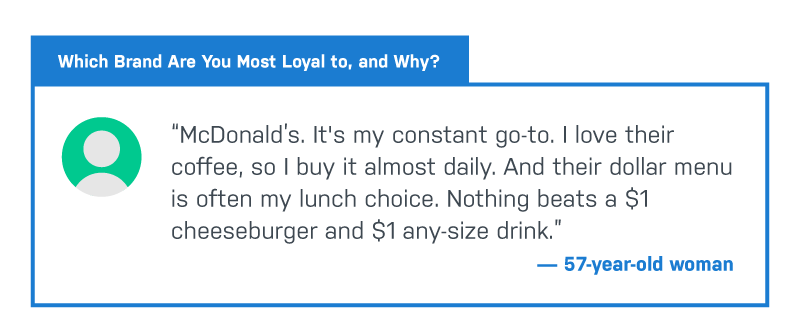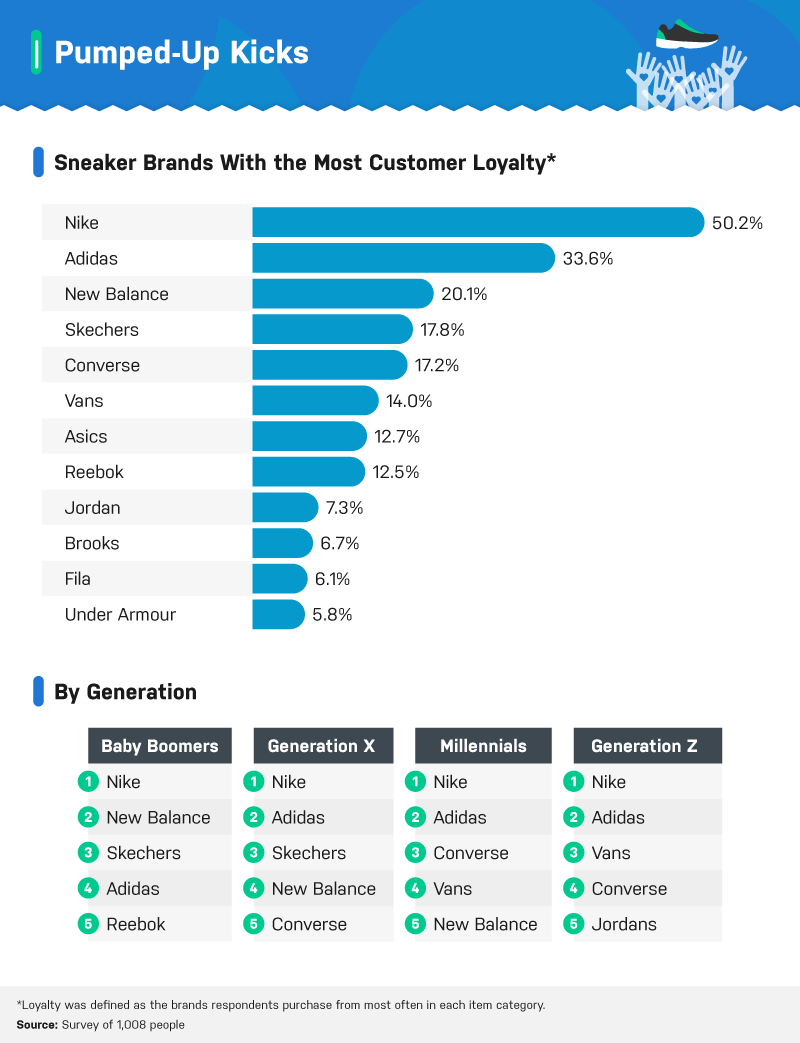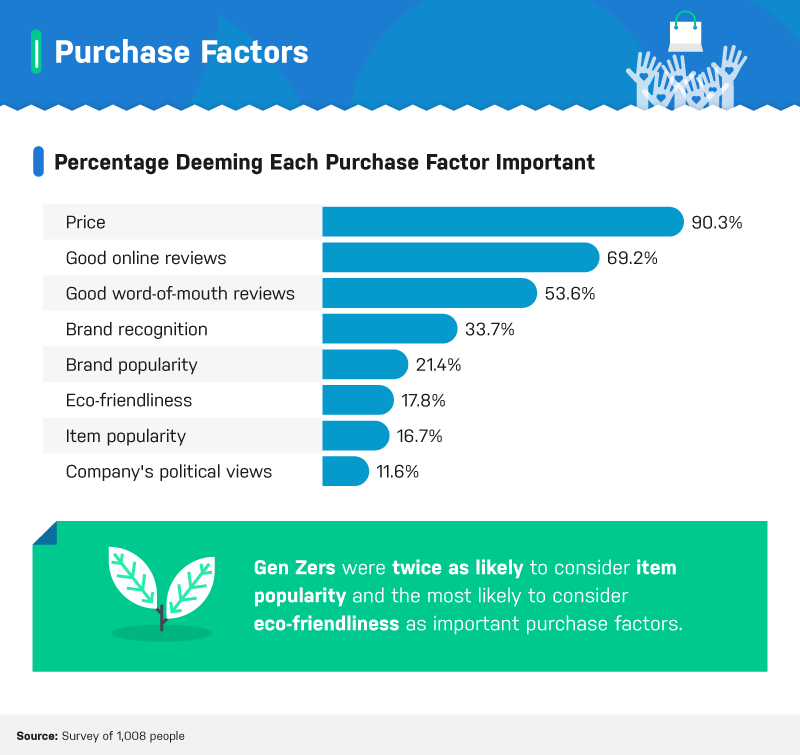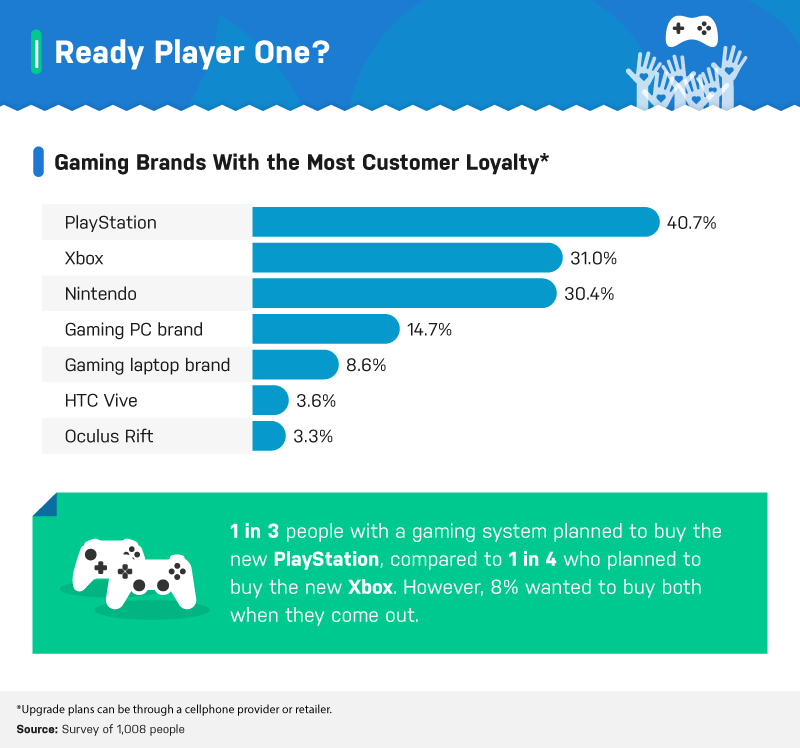
 When it comes to brand loyalty, retaining customers is just half the battle. Keeping them satisfied is an entirely different feat. New trends, advancements in technology, and changes to digital marketing are leading some brands to prominence with strong and loyal fan bases.
When it comes to brand loyalty, retaining customers is just half the battle. Keeping them satisfied is an entirely different feat. New trends, advancements in technology, and changes to digital marketing are leading some brands to prominence with strong and loyal fan bases.
From apparel and tech to food and video games, brand loyalty extends across all industries, and customers have a major influence on even the largest corporations.

To learn more, we asked over 1,000 people which brands they consider themselves the most loyal to or purchase from the most often. Does Apple or Android have the most loyal customers? What about Xbox versus PlayStation? Read on to see which brands have the most dedicated supporters.
Table of Contents
Loyal Fans of Fast Dining

Chick-fil-A and McDonald’s claimed the most loyal customers, taking the top two spots overall and for nearly all generations. However, McDonald’s is definitely not the new kid on the block: With 14,000 restaurants and counting in the U.S., this brand continues to adapt to market trends and remains one of the most popular fast-food chains in America.
Expert List: Top 50 SEO Companies in the USA
We researched the top SEO firms that can grow your business.
In comparison, Chick-fil-A is a relatively new company, although its extremely active fan base has helped the chain rise from No. 7 to the third-largest restaurant in just one year (with continued growth on the horizon). To thank their dedicated customers, the company recently updated its mobile app and extended new offerings as a part of its membership rewards program, Chick-fil-A One.
The main exception to the dominance of McDonald’s and Chick-fil-A is Taco Bell, which garnered enough loyalty among millennials that it took the No. 2 spot for this generation. With millennials moving away from meat consumption, Taco Bell has happily received plant-based customers for years, being the only and first fast-food restaurant with a certification by the American Vegetarian Association.

Smart Devices That Keep Us Hooked

Android was the preferred cellphone brand among survey participants, garnering votes from nearly half the respondent pool. Compared to Apple, which currently has 1.4 billion active devices, there are now over 2.5 billion active Android users.
Regardless of the overall popularity of Android, Gen Zers preferred the iPhone: Over 65% of Gen Z respondents preferred Apple to Android, the most of any generation. Smart devices have changed the way we process information, share, and communicate, the latter being a major point among Gen Zers. In fact, Android users are often kept out of group chats and other group communications with iPhone users in this generation.

Gaming Affiliations
Sony’s PlayStation and its four (soon to be five) iterations claimed the most dedicated customers, followed by Xbox and Nintendo, respectively. But just as fans can be loyal to a particular game console, they also hold strong allegiance to game franchises that might be unique to particular gaming systems.
Expert List: Top 50 SEO Companies in the USA
We researched the top SEO firms that can grow your business.
As a result, game developers are now focusing on cross-console adaptability, meaning players on a PS4 can play with users on an Xbox One. The newest chapter in the first-person shooter franchise, “Call of Duty: Modern Warfare,” is the latest to bridge its gameplay across multiple platforms, even from PC to console.

Sneakerhead Culture and Brand Loyalty

Nike fans, overall and across all generations, were the most likely to be repeat customers. Over the years, the brand’s “Just Do It” motto has been the center of a slew of iconic commercials, featuring prominent athletes like Charles Barkley and Michael Jordan. These marketing campaigns bolstered the brand and inspired customers of all kinds.
Now, Nike has again set the standard by launching a series of four apps, a loyalty program called Nike+, and an entirely new retail experience framed around efficiency and personalization.
Brand loyalty, when it comes to apparel, is important since new versions of sneakers come out often – and they aren’t cheap. Regardless of whether you enjoy shoes by Nike, Adidas, New Balance, or any other brand on this list, loyalty, celebrity endorsement, and name recognition can influence a brand’s success dramatically.
What Drives Us to Buy?

Over 9 in 10 survey participants valued price when considering a product. Buyers often want to save money and, as such, will determine an item’s value by the price tag.
Brand recognition and popularity were important to survey participants, especially younger ones, but good word-of-mouth and online reviews proved to be more important overall. Unfortunately, digital reviews may not always be accurate. Fake and fraudulent online reviews have become quite common, and even the ones that appear “verified” can be falsified, so it’s crucial to double- and triple-check reviews and possibly take them with a grain of salt.
Expert List: Top 50 SEO Companies in the USA
We researched the top SEO firms that can grow your business.
Brand Loyalty and the 21st Century
With social media’s influence and digital marketing taking over, brands are using more tactics than ever to appeal to long-time customers as well as new ones. Using nostalgia, classic brands keep us hooked with quality products and fulfilled expectations. On the other hand, new companies seek to find their place with innovative product offerings.
Brand loyalty is key, and establishing a strong presence among search engine results can mean the difference between your brand staying relevant and losing valuable customers. Find your way to the top of Google results with a specialized SEO company that works toward your goals and in your best interests. Head over to BestSEOCompanies.com to browse through SEO companies that are well-versed in a variety of needs, including local SEO, Amazon marketing, e-commerce, and more.
Methodology
To gather the data used above, a survey was run using Amazon’s Mechanical Turk service. A total of 1,003 respondents were questioned, with 225 baby boomers (7% margin of error), 300 from Generation X (6% margin of error), 328 millennials (5% margin of error), and 150 from Generation Z (8% margin of error).
Limitations
All data presented above rely on self-reporting. There can be many issues with self-reported data, such as telescoping and exaggeration. To combat these issues, an attention check was used to ensure all respondents paid attention. In the survey, “loyalty” was defined as the brands that respondents purchase from the most in each item category.
Fair Use Statement
Looking to utilize SEO as a means to gain customers? Feel free to share this information with your friends and colleagues. However, cite us by name when mentioning our findings, and be sure to share this information for noncommercial use only, please.
 Best SEO Companies
Best SEO Companies
 Best SEO Companies
Best SEO Companies